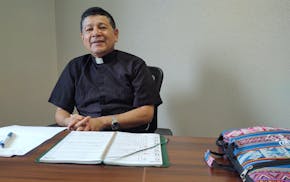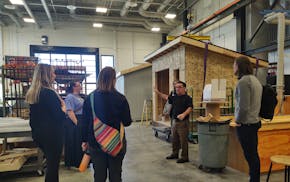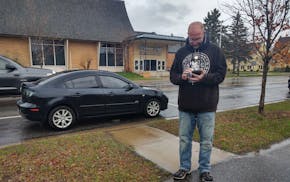How wrong I was to think U.S. Rep. Michelle Fischbach doesn't care about me!
Why, just recently the phone rang and there was her voice, asking me for my opinion on the farm bill. What did I think about crop insurance? What did I think about expanding global markets for American products?
It wasn't really her, of course. It was a recorded message touting some of her accomplishments in office and asking me a few questions.
I was waiting for her to say, "To continue federally subsidized crop insurance for micro farms, press one."
I would have pressed the heck out of that one. Kind of like Princess Di voting to abolish the monarchy in season five of "The Crown." Yes! Yes! The people who grow food for their local schools and hospitals are just as vulnerable to hail as the big corn-and-soybean growers, and they deserve federal crop insurance, too.
But she didn't ask about that.
She wanted to know if I supported investing in rural Minnesota. Well, that could mean anything from support for rural dentists to helping 10,000-cow dairies turn into 20,000-cow dairies. How do I know, Michelle? It depends on what you want to do with it!
When I wrote for the Alexandria newspaper, Fischbach sent out regular emails criticizing Democrats and touting her work. Beyond that, she wasn't available. Once, I reached out to her for comment for some farm stories I was writing. Her predecessor, Collin Peterson, had talked to me about federal farm policy for an hour. But I heard nothing back from Fischbach.
As a constituent, she hasn't seemed interested in my opinion until this year, when she faces a primary challenge from Steve Boyd in west-central Minnesota.
Keeping in touch with her district isn't easy. I'll give her that. Minnesota's Seventh Congressional District covers most of western Minnesota, from the Canadian border almost to Iowa. Driving from the northern edge to the southern edge takes about seven or eight hours, depending on how many boats or tractors you're stuck behind.
Not to wax nostalgic for the past, but Peterson held town hall meetings throughout the district during the health care debates. You didn't have to be in his party to attend. All you had to do was live in his district, and you could sign up for a turn to speak. Lots of people spoke, and he sat at a table in the front of the room the entire time.
Why hasn't Fischbach done that? She has more options to meet with her constituents than Peterson had. She could easily hold digital town-hall meetings. But I've not seen that, either.
You don't get to ask her questions, and I have so many questions. What is she doing to heal this divided land? Does she think we should reverse the federal ag policy of "get big or get out" that has shuttered so many Minnesota farms and hurt so many rural Minnesota communities? What is she doing to help rural ambulance services? And where is she on climate change? Where is she in the years when thick, choking smoke rolls down from Canada?
Fischbach's people know I'm writing this column. They know the substance of it. And yet, still, crickets. Maybe the perceived risk of speaking to a journalist outweighs the perceived benefits. Yet more and more Boyd signs are popping up in our district.
Boyd is handsome and articulate with an underlying steeliness. He shows up. He talks to the news media. He takes tough questions, although he doesn't always answer them. He won't come right out and call himself a Christian nationalist, but he doesn't deny it, either. Fischbach has significantly outraised him, but he's getting out and meeting people, campaigning hard, and it shows. He advertises his events on social media well ahead of time. Like Peterson's era, anybody who wants to go can go.
A longtime politico like Fischbach should have sewn up her party's endorsement, especially since she has Trump's endorsement. But the GOP chose not to endorse anyone, a win for Boyd.
Whoever gets the Republican nomination during the Aug. 13 primary will face the presumptive Democratic nominee, AJ Peters, in the general election. Peters runs a computer business and is the board chair of Hands of Hope Resource Center, which helps crime victims in Morrison and Todd counties.
I actually appreciated Fischbach soliciting my opinion. Next step: Take tough questions from journalists. And the general public.

Tolkkinen: Fergus Falls priest who studied with Pope Leo says he has good hearing 'to hear everyone'

Tolkkinen: Just when I was starting to lose myself in nature's grandeur, along came a motorcycle

Tolkkinen: On a three-day northern Minnesota tour, the grit and glory of our state became clear

Tolkkinen: Brainerd City Council should spend a night, or 30, sleeping outdoors

